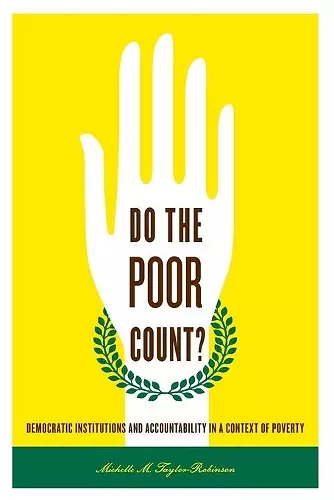Do the Poor Count?
Democratic Institutions and Accountability in a Context of Poverty
Michelle M Taylor-Robinson author
Format:Paperback
Publisher:Pennsylvania State University Press
Published:15th Oct '11
Currently unavailable, and unfortunately no date known when it will be back
This paperback is available in another edition too:
- Hardback£69.99(9780271037509)

Latin America’s flirtation with neoliberal economic restructuring in the 1980s and 1990s (the so-called Washington Consensus strategy) had the effect of increasing income inequality throughout the region. The aim of this economic policy was in part to create the conditions for stable democracy by ensuring efficient economic use of resources, both human and capital, but the widening gap between rich and poor threatened to undermine political stability. At the heart of the dilemma faced by these new democracies is the question of accountability: Are all citizens equally capable of holding the government accountable if it does not represent their interests? In this book, Michelle Taylor-Robinson investigates both the formal institutions of democracy (such as electoral rules and the design of the legislative and executive branches) and informal institutions (such as the nomination procedures of political parties and patron-client relationships) to see what incentives legislators have to pay attention to the needs of poor people and thereby adequately represent their interests.
“Despite the presence of large—even majority—poor populations in Latin America, democratic institutions and policies frequently do not reflect their interests. Taylor-Robinson’s book presents a thoughtful analysis of the causes of that ‘representation gap.’ She offers a rich institutional account, suggesting that a combination of institutions (electoral, nominations, and clientelistic) leads elected officials to respond differently to their privileged and poor constituencies. Both cross-national survey data and a detailed study of the Honduran case support her claim that the best representation the poor can hope for is usually clientelistic representation, and even that is not guaranteed. Yet Taylor-Robinson provides a final twist, insisting that clientelistic representation itself offers more benefits than are usually seen, for the poor themselves and for the stability of their political systems. Overall, this is an impressive book, which fruitfully applies the theoretical tools of rational-choice institutionalism to one of the most important problems of contemporary Latin American politics.”
—Kathryn Hochstetler, Balsillie School of International Affairs and University of Waterloo
“Most theories of democratic accountability ignore that poor voters as electoral principals encounter special handicaps in aligning elected agents with their preferences. Moreover, if elected politicians deliver clientelistic goods or services to their constituencies, received wisdom considers this a form of voter co-optation that offers few benefits to its recipients and distracts them from their agents’ accountability on policy. In her book, Taylor-Robinson challenges both premises. Clientelistic exchange may sometimes be the only game in town to satisfy poor people, and actually it may on occasion deliver meaningful benefits to its target constituencies. The major achievement of Taylor-Robinson’s book is to specify institutional and strategic conditions under which the poor may gain a modicum of leverage in clientelistic accountability relations. Voters stand a better chance to avail themselves of clientelistic resources when a multiplicity of parties competes for the support of the poor in an electoral marketplace where voters incur only few costs of changing their partisan affiliation and where open list electoral systems with proportional representation enable poor voters to concentrate their support on individual candidates rather than parties at large. The book tests empirical implications of this argument with a cross-national dataset on poor people’s satisfaction with democracy. Taylor-Robinson then goes on to demonstrate the specific conditions that make clientelistic politicians more or less accountable in a detailed, penetrating case study of Honduran politics that makes useful reading even for non-Latin Americanists. Taylor-Robinson’s research results in a thought-provoking reassessment of clientelistic partisan relations. It is destined to resonate broadly among students of democratic accountability.”
—Herbert Kitschelt, Duke University
“Do the Poor Count? offers a novel and interesting explanation for why the poor often fail to get what they want through democratic politics. It helps explain how democracy really works.”
—Barbara Geddes, UCLA
ISBN: 9780271037516
Dimensions: 229mm x 152mm x 18mm
Weight: 386g
248 pages